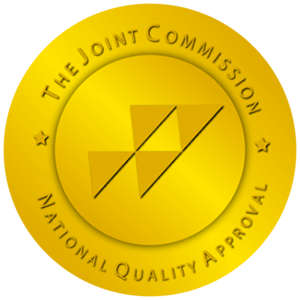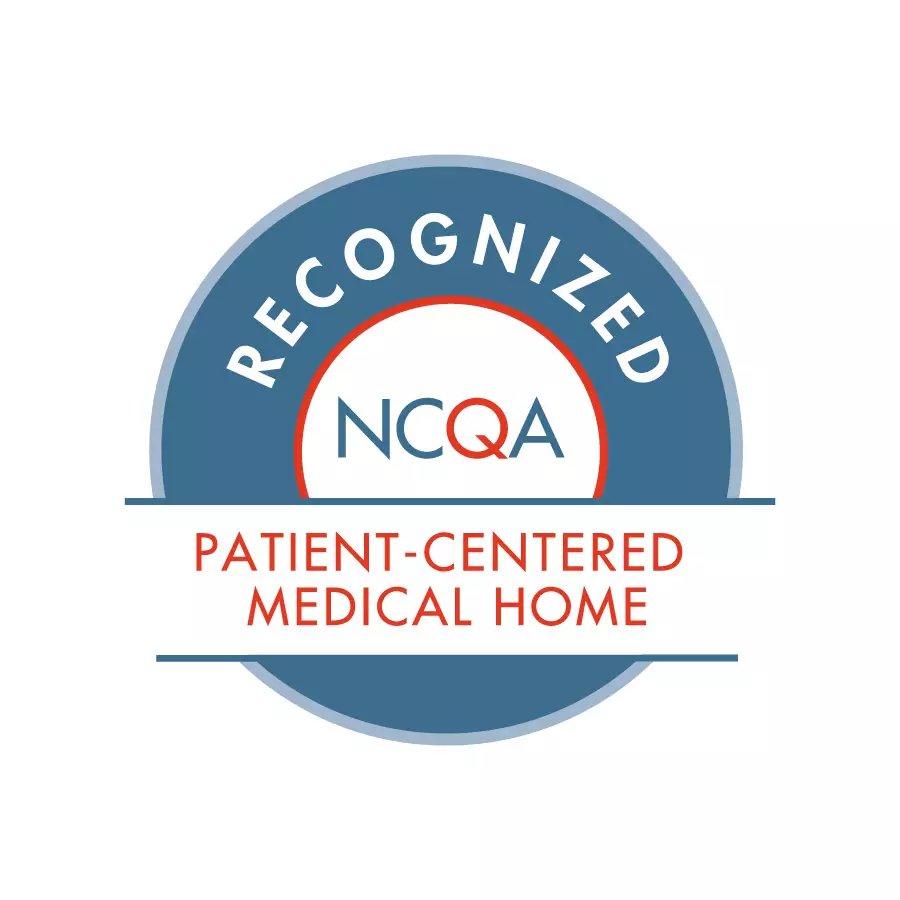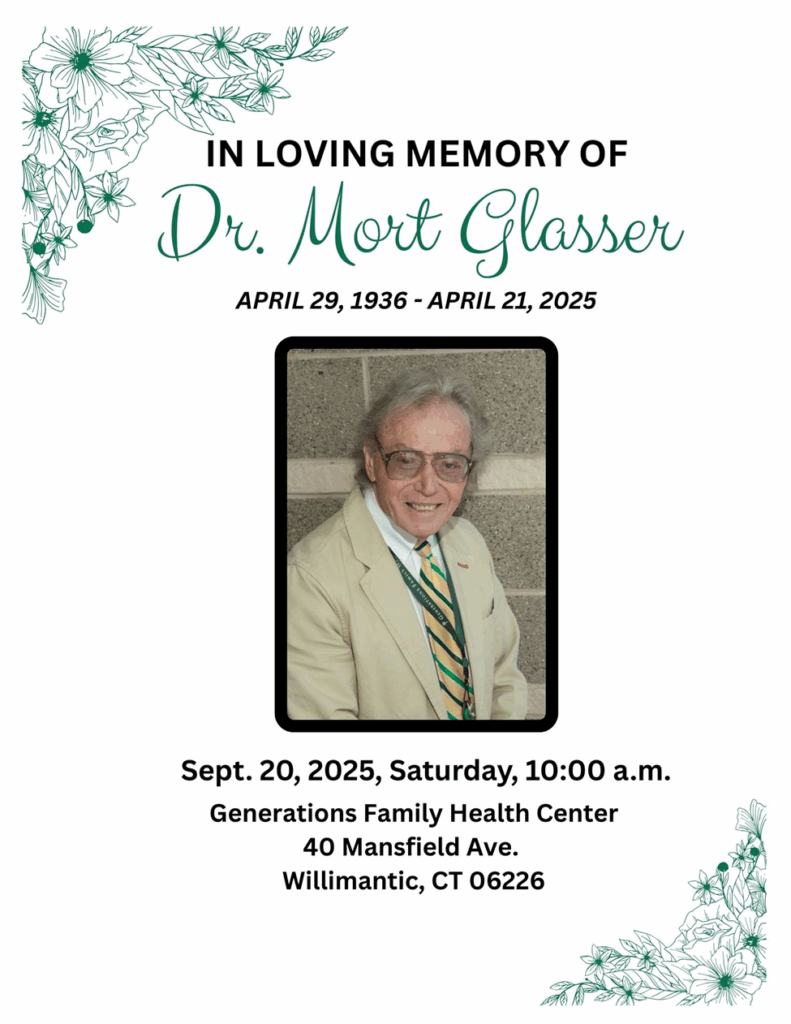
CT News Junkie by Brian Scott-Smith August 6, 2025, 11:31 am
Aug 7, 2025
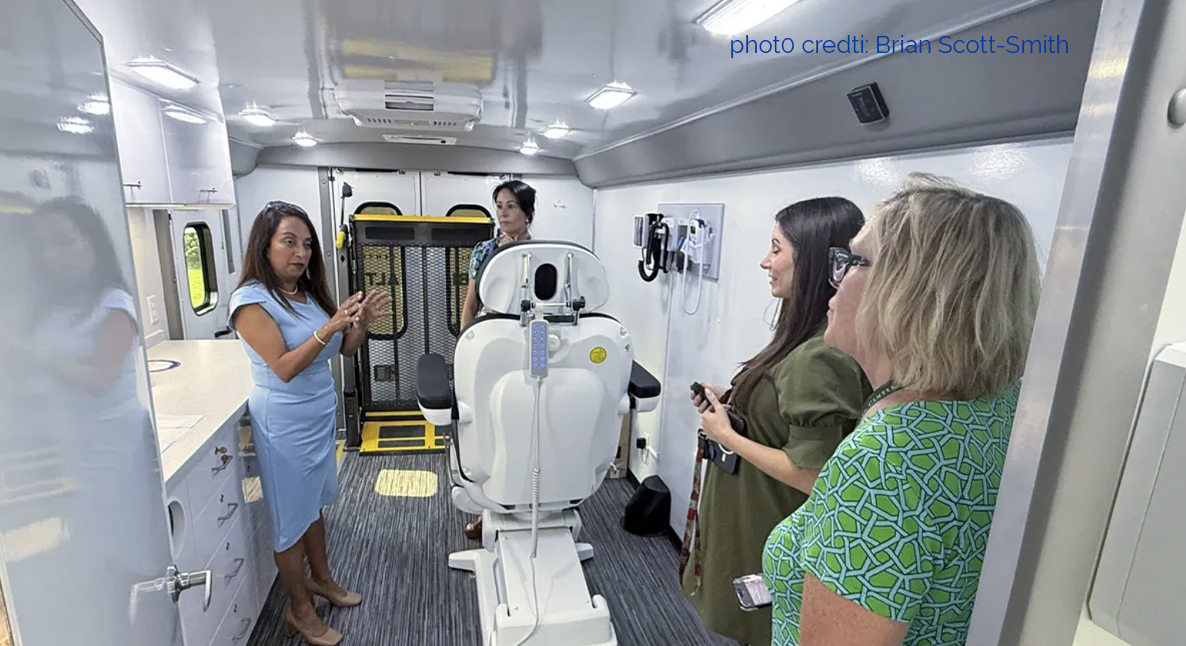
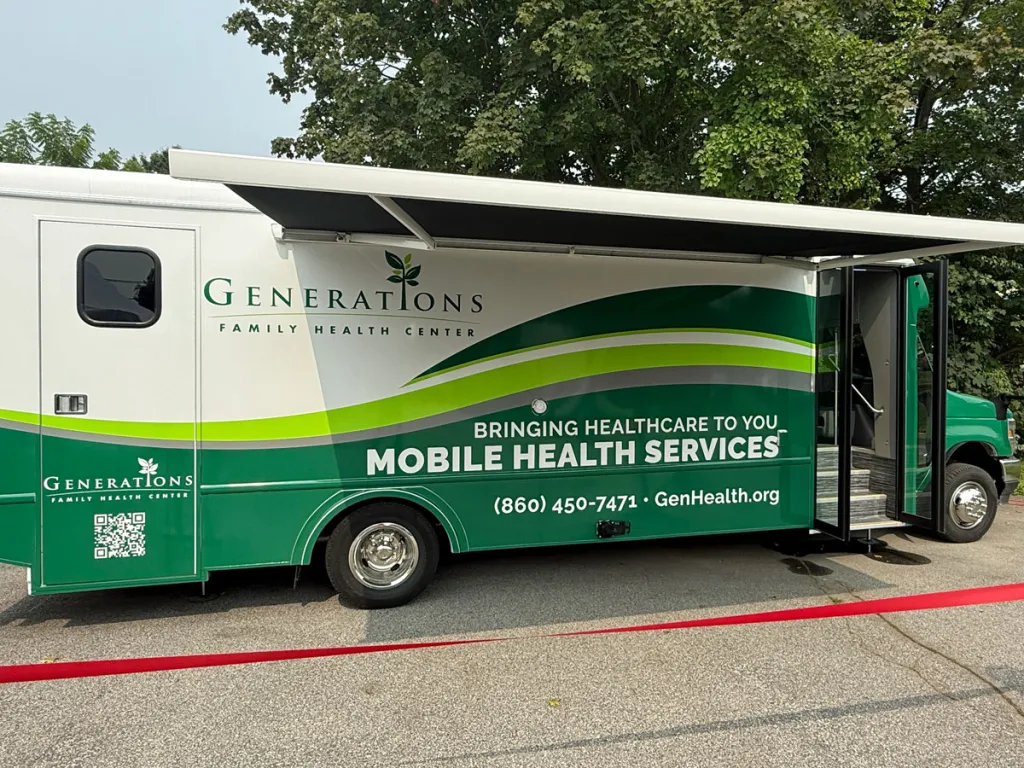
WILLIMANTIC, CT — Eastern Connecticut is about to get an unusual example that sometimes less really is more, as a new mobile health care unit takes to the streets.
The new vehicle is much smaller than the 44-foot trailer it replaces. But the more modern unit can provide care in smaller places, and doesn’t require a commercial driver’s license to operate, according to Melissa Meyers, CEO of Generations Family Health Center in Willimantic.
“Our old … unit was servicing over 30 locations at one time, and covered over 200,000 miles traveling to where patients are to deliver our mission,” she said. “So, it’s just an incredible example of what community health centers do across the country to innovate and make sure that access to care is ensured everywhere.”
Generations dedicated the new half-million-dollar truck Tuesday. Meyers said Generations’ coverage area includes all of Windham County and parts of New London and Tolland counties.
Funding for the new vehicle came from the Department of Public Health through a larger state bonding request, according to DPH Commissioner Manisha Juthani. She added the operational funding from the federal government means the group must stick to its existing service area, but with the help of partner funding Generations would look to expand that area to provide affordable healthcare to other families and individuals that need it.
Congressman Joe Courtney, D-2nd District, said mobile health was especially important in that area of the state.
“Anyone who kind of looks at the map of Connecticut knows that eastern Connecticut is the most sparsely populated part of the state.” He said. “The tyranny of distance is something that just continues to challenge access to programs, whether it’s for veterans or healthcare or just a whole range of services.”
The region’s transportation system also makes it difficult for residents in eastern Connecticut to access health care, particularly for the low-income population, he said.
Courtney said the state was fortunate to get funding for the operational side of the health unit through the Department of Health and Human Services and its Health Resources and Services Administration (HRSA)
“The HRSA unit is something that is not automatic formula funded. You’ve got to go out there and compete for it,” he said.
Nicole Zappone @TheChronicleCT
Aug 7, 2025
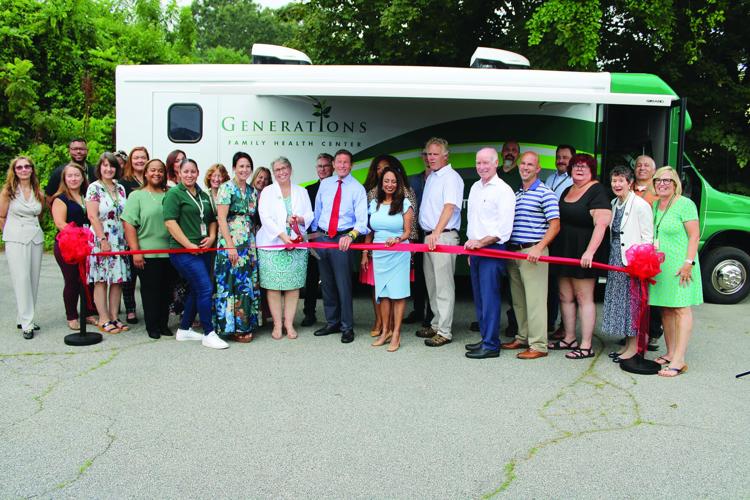
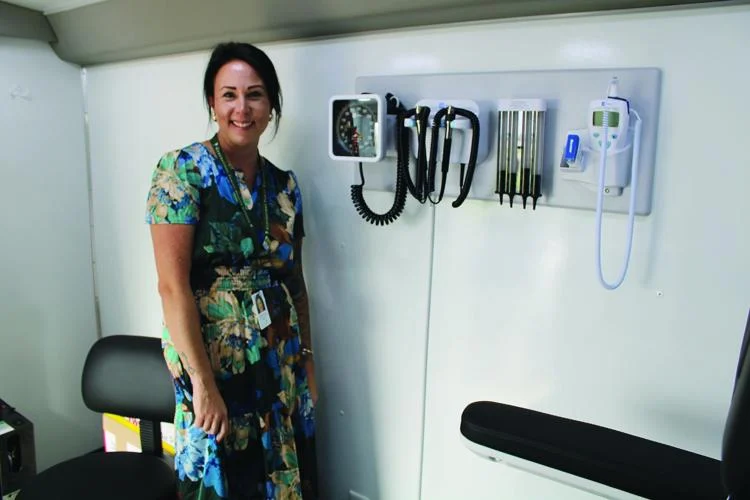
WILLIMANTIC — Generations Family Health Center unveiled its new Mobile Health Unit in partnership with the Northeastern Connecticut Community Chamber on Tuesday.
“It’s so appropriate that we’re launching our new Mobile Health Unit during National Community Health Week,” said Generations CEO Melissa Meyers. “For 60 years, health centers have provided high-quality, affordable care to all, serving 1 in 10 Americans.”
The Mobile Health Unit provides a variety of medical services such as primary care, preventive and sick care, as well as testing and treatment of chronic diseases.
Dental services provided include routine preventative care, restorative treatments including dentures, and emergency treatment.
Other services include behavioral health, specialty services, and care coordination/support services.
There are several patient benefits with the van, including prescription access and management, bilingual staff, care, and services, and more. In-person visits and telehealth care are available.
Payment options include Husky Medicaid, Medicare, and other commercial insurance plans, including the Affordable Care Act plans that are offered by Access Health CT. Discounts are available to those who may qualify for the sliding fee scale program, which is based on family size and income.
The Mobile Health Unit was funded by the Health Disparities and Prevention Grant Program administered by the Connecticut Department of Public Health.
Operations are supported by funding from the DPH Health Resources and Services Administration.
“Through innovations like this mobile unit, and the dedication of our staff, we’re working to ensure healthcare is a right for all, not a privilege for some,” Meyers said. “By literally hitting the road, this new unit helps break down the barriers that prevent so many from accessing care.”
The celebration, which kicked off with a ribbon-cutting ceremony on Tuesday morning, featured remarks from U.S. Senator Richard Blumenthal, Congressman Joe Courtney, and Dr. Manisha Juthani, Commissioner of the Connecticut Department of Public Health, along with Mayor Tom DeVivo and GFHC Board of Directors Chairperson Joan Marshall.
“Diversity, equity, and inclusion are values that make America great, and bringing healthcare to people where they are is part of those values,” Blumenthal said. “The real heroes, or the dignitaries today, are not Joe and myself, but you. You are doing this work every day, you are on the front lines, you are dealing with the challenges in a very real and human way, trying to make their lives better.”
Blumenthal said the van represents bringing healthcare to people, meeting them where they live, ensuring they understand the services offered, and preventing healthcare problems, along with education and awareness.
The previous van had about 200,000 miles on it, and Generations hopes to continue with the care and the distance that it will travel.
“In this country, we are facing a healthcare crisis, because what is happening in Washington is historical and not in a good way,” Blumenthal said.
Meyes added that they want to help as many people as they can in Eastern Connecticut with the funds they received.
“Slowly over this time in the next year, they are going to be losing their healthcare coverage, and thank God, community health centers are available to provide that preventive medicine, primary medical, behavioral health on an outpatient basis,” Meyers said. “We provide it with a sliding fee scale regardless of your ability to pay. That’s not going to change. We need to adapt.”
There are over 40 towns in their existing service area, and they are seeking additional partners to expand their services. They are looking for libraries, schools, senior centers, and other community locations to host the mobile van.
“We need to count on our partners in the area,” Meyers said. “We work hard to try to make it work, because it’s our mission.”
The van visits enrolled schools to provide dental services for children during school hours, on school premises, in fully-equipped dental exam rooms.
Those partnering schools include Danielson, Norwich, Putnam, Willimantic, and the Putnam School-Based Health Center. Generations is looking to partner with additional school districts.
Any student enrolled at a school is eligible for a visit from the Mobile Health Unit to receive services. Eligibility includes both current dental patients of Generations Family Health Center and new dental patients.
Dental services include preventative oral health care, such as exams, cleanings, fluoride treatments, and sealants. Oral Health Education is also included.
The Mobile Van travels throughout all of Windham County, along with parts of Tolland County and New London.
To learn more about the Mobile Health Unit and view the service schedule, visit: https://genhealth.org/services/mobile-health-unit.
Eastern Connecticut – Generations Family Health Center is deeply saddened to share the news of the passing of its first Chief Medical Officer, Dr. Morton Glasser, who died on April 21, 2025, in Providence, Rhode Island at the age of 88 following an extended illness.
Dr. Glasser dedicated more than six decades of his life to the field of medicine, including nearly four decades of service to Generations Family Health Center. He was honored at a community retirement celebration in November 2022 at the Willimantic Elks Club, where friends, colleagues, and patients gathered to celebrate his remarkable career.
A graduate of Downstate Medical School (1961), Dr. Glasser began his medical journey serving in the U.S. Public Health Service’s Indian Health Service in Oklahoma, working with the Choctaw Nation from 1962–1964. He then moved to Connecticut, where he opened a private practice in Willimantic and became an integral figure in the region’s healthcare community.
Dr. Glasser joined Generations in 1985 as its Medical Director, playing a pivotal role in shaping the clinical standards and mission of the health center. He later became Chief Medical Officer, a role he held until his retirement. During his tenure, he was a relentless advocate for access to quality care, particularly for underserved and marginalized communities. He helped establish a culture of clinical excellence that continues to guide Generations today.
“Dr. Glasser was a pioneer in medicine throughout his career, always centering his work around access to care and clinical excellence,” said Melissa Meyers, Chief Executive Officer at Generations. “His dedication to the individuals and communities he served has left an indelible mark on our organization. It is our honor to carry forward the tremendous legacy he leaves behind.”
In addition to his work at Generations, Dr. Glasser was a founder of Perception Programs, a substance use treatment center in Willimantic, and held leadership roles at Windham Hospital, including Chair of the Education Committee and Chair of the Department of Family Practice. His many accolades include the 2003 Physician of the Year Award from Windham Community Memorial Hospital and the 2014 Award of Excellence from the Connecticut Academy of Family Physicians.
Dr. Glasser was also a lifelong learner and a man of many interests—an accomplished fencer, tennis player, birdwatcher, pool and chess player, and lover of the arts. He is remembered not only for his professional contributions, but for his warmth, humility, and deep compassion for his patients.
In his own words at retirement, Dr. Glasser shared:
“I always considered it a privilege to care for my patients. They trusted me with their pain, worries, losses, and grief—and this is what I will miss most. I would not change anything and would do this all over again.”
Dr. Glasser is survived by his beloved wife Irene and their children, grandchildren, and extended family.
Funeral services will be held at the Hoffman Jewish Memorial Chapel, 11 Fowler Avenue, Newport, RI on Friday, April 25, at 11:00 AM, with burial to follow at Beth Olam Cemetery in Middletown. Shiva will be observed at the Glasser home, 11 Bull Street, Newport, from 5–7 PM on the same day.
In lieu of flowers, memorial donations may be made to:
Generations Family Health Center, Inc., Attn: Fiscal Department, 40 Mansfield Avenue, Willimantic, CT 06226
or
Windham Hospital Foundation, 112 Mansfield Avenue, Willimantic, CT 06226
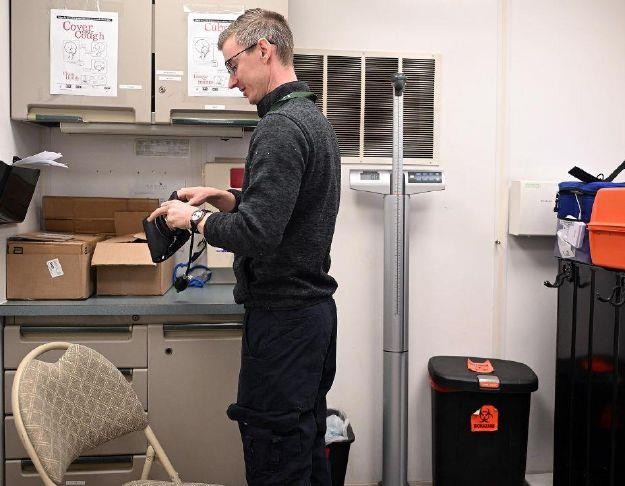
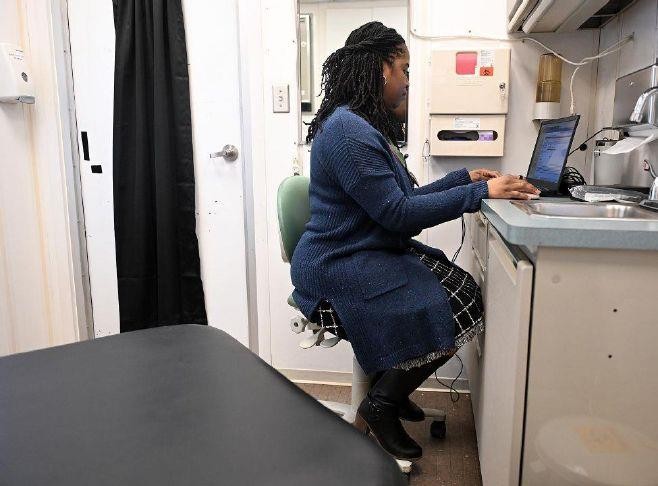
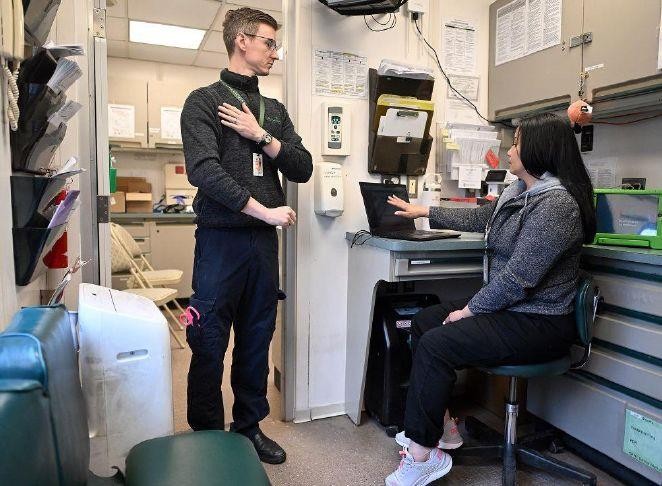
The Generations Family Health Center’s mobile clinic is parked outside the Hale YMCA Youth & Family Center in Putnam Tuesday, April 8, 2025. (Sarah Gordon/The Day)
Alison Cross
Day Staff Writer- Author
Apr 20, 2025 3:00 PM
Putnam — On a rainy Tuesday, medical staff from Generations Family Health Center prepped for a day of appointments outside the Hale YMCA.
From inside the exam room, you never would have known the office was on wheels, save for the constant rumble of the truck’s engine that kept the operation running.
In a region with fewer health care providers per person than anywhere else in the state, Generations is working to boost access by making dental and medical care mobile.
For each primary care provider or dentist in Windham County, there are 2,050 residents, a 2022 report | Opens PDF by DataHaven found. The state average is 1,430 for every provider.
Within the northeast, Plainfield and Killingly are home to the lowest rates of health care utilization in the region. In 2020, up to 37% of adults in these areas had not been to a dentist within the past year and up to 27% did not have an annual checkup in 2021, according to a DataHaven report | Opens PDF on the 17 towns that make up the Northeastern Connecticut Council of Governments.
From rural parts of Putnam, Plainfield and Killingly to more urban areas in Norwich and New London, the Generations Mobile Health Unit travels each week to apartment complexes, community centers, YMCAs, schools, farms and other local hubs to provide dental and medical care in places where traditional health facilities are out of reach, either physically or financially.
Registered nurse Greg Hook described the Mobile Health Unit as a “traditional health center catering towards those who don’t have that traditional access.”
“We really try to bring health care closer to people,” Megan Thorton, Generation’s community health and infectious disease program manager, said. “This really is a public health and a community health effort.”
Breaking barriers
Kaleena Crooks, an advanced practice registered nurse with the mobile unit, said the program is about “accessing people where they are.” While appointments are recommended, walk-ins are always welcome.
“Not a lot of people can get to the office, and sometimes it can be a lot just to get that appointment in the office,” Crooks said. “We’re here and we’re open to anybody. … You see the bus, you come in, you get seen and we’ll help you as much as we can.”
On a Wednesday morning, Jeniffer Quiles stepped out of her home at Windham Heights Apartments and walked to the Mobile Health Unit stationed in the complex’s parking lot for a dental check-up.
While Quiles has a dentist, she said her time off as a paraprofessional is limited. Quiles said her few days off are usually spent bringing herself or her three kids to medical visits.
That day, Quiles had already taken paid time off for a doctor’s appointment, so when she learned that the mobile unit would be offering dental care, she signed up for her first visit. It helped that the unit was right outside her apartment building — Quiles does not drive, and that day her husband was not available to drive her.
“It was super convenient,” Quiles said in Spanish as the mobile unit’s community health worker, Glory Cruz, translated. “It was really good. (The hygienist) had good hands and she was really nice.”
As she said goodbye to the mobile unit’s staff, Quiles explained that she needed to look for the bus schedule — if it did not line up with her 11 a.m. appointment, Quiles said she would need to walk more than an hour to get to the doctor’s office on her own.
“Transportation is a huge barrier in our system. Uber and Lyft are kind of non-existent up here,” Thornton said. “If you live in Danielson and your doctor’s up in Putnam, you’re not walking.”
Thornton said other prohibitive factors include a lack of paid time off and high costs that make health care out of reach for some patients.
“When you are worried about paying just your basic needs, your health care just simply comes last,” Thornton said. “(If) you have to pay your electricity, and you got to get groceries for your kids, (and) you got to pay your rent, you don’t think ‘Well, I need to go to the doctor and check out my hypertension.’”
Not just medical care
Thornton explained that at the mobile unit, staff “try to be a one-stop shop,” with onsite enrollment for insurance, SNAP benefits, energy assistance, housing programs and other community resources.
“All the things that really make coming here and getting your health care a lot easier,” Thornton said.
Generations, a private, not-for-profit, regional Federally Qualified Health Center, and its mobile unit also operate on a sliding fee scale with payment programs for patients who do not have insurance.
Crooks explained that getting patients adequate care can require a bit of creativity, especially when costs are not covered by insurance.
“For people that come in, they don’t have insurance, but they have all these chronic conditions. I can’t just simply say ‘Oh you’re going to see an endocrinologist or you’re going to see a cardiologist, or do this imaging’ because they don’t have the money to do it,” Crooks said. “It’s (about) finding creative ways … to provide this quality care with what we have.”
Crooks said that sometimes what patients need is not expressly medical.
“Sometimes it’s just ‘I need shoes over the winter, and I don’t have shoes,’” Crooks said. “(We say) ‘OK, where can we get that? Can we find some funds or can we get them shoes?’ So sometimes it’s social needs as well.”
Educating patients
Brandie Frechette, a registered dental hygienist, said most patients at the mobile unit “aren’t aware how unhealthy their mouths are until they come in.”
In addition to Generations, Frechette said also works as a hygienist at a private practice. In traditional dentist offices where patients come in twice a year for cleanings, Frechette said practitioners can keep up with preventative treatments, catch cavities before fillings are required and address concerns as they arise.
The typical mobile patient does not have that same level of preventative care.
“In private practice … we have a pulse on their health. We’re able to compare back to six months ago, continue to educate them, continue to clean their teeth, (and) assess their periodontal health,” Frechette said. “Here (at the mobile unit), it’s kind of the opposite. We’re trying to chase that disease, chase that cavity, rather than being able to prevent and stop it where it’s at.”
“There’s definitely a higher need here because they’re not followed, they don’t have a dentist of record and they don’t have preventative care,” Frechette added. “We’re trying to bridge that gap to get them back into a facility where they can see the dentist regularly.”
Aside from cavities, Frechette said one of the most common conditions among mobile unit patients is gum disease.
According to the Centers for Disease Control and Prevention, roughly 60% of low-income adults between the ages of 20 and 64 have periodontitis, a type of gum disease that can lead to bone loss, bacterial infections and has been linked to respiratory disease, rheumatoid arthritis, coronary artery disease and other conditions. In comparison, periodontitis impacts just 30% of adults from higher income thresholds.
Frechette said that part of the challenge is a lack of education.
“They’re not aware, if they have bleeding gums, what that could do systemically to their overall health,” Frechette said.
Preventing ER visits
Hook said one of the unit’s goals is treating patients before they end up in the emergency room.
A 12-year study published by the National Library of Medicine found that between 2005 and 2016, the rate of ER visits in rural hospitals rose by 75%, outpacing hospitals in urban settings whose ER visit rates rose by 6% over the same period. The researchers noted that the rise in rural ER use was particularly apparent among Medicare beneficiaries and uninsured patients. By the final year of the study, rural hospitals in the U.S. had 65 visits per 100 persons in their ERs, urban hospitals had 43.
Hook explained that some patients with chronic respiratory problems would visit the ER up to four times a week for treatment. Now, Hook said the mobile unit can manage their acute illness before their condition exacerbates.
Hook said ER visits are also common for patients with unmanaged diabetes. When blood sugar levels skyrocket or fall dangerously low, Hook said the ER can offer a “quick fix” but it does not address the root cause of the problem.
Hook said mobile unit visits can offer more time to provide individualized care.
“We can actually focus on that chronic illness. I have the time to go through individual diets with patients, (and say) ‘Hey maybe we shouldn’t be eating this. Maybe we should switch to this.’ And then really focus on (asking) ‘What are your personal barriers? Why are you eating like this? Why are you not able to administer your medications properly?’” Hook said. “It’s more of a refined focus.”
For some patients, Hook said it’s just a matter of making sure patients have the prescriptions they need to treat hypertension, high cholesterol, diabetes and other conditions.
He said the impact of the mobile unit becomes apparent once the patients return.
“They come back in a month, two months, three months, completely managed, or at least in a much better spot,” Hook said. “That’s always a good thing when you see this astronomically high number start reducing every single time you see the patients.”
a.cross@theday.com
Eastern Connecticut – Generations Family Health Center, Inc. (Generations) is proud to announce the celebration of its 40th anniversary. Since its establishment in 1984, Generations has been dedicated to providing essential healthcare services to the residents of eastern Connecticut.
From its modest beginnings as a part-time medical clinic in the small “White House” in Willimantic, Generations has expanded to become a private, not-for-profit, regional Federally Qualified Health Center (FQHC). The center offers a full spectrum of primary health care, oral health care, behavioral health care, and case management and support services through its locations in Willimantic, Norwich, Putnam, Danielson, a school-based health center in Putnam as well as a Mobile Health Unit.
Generations also operates various community programs aimed at special populations, including Migrant Farm Workers, Children in Foster Care, Children and Youth with Special Health Care Needs (CYSHCN), Health Care to the Homeless, Affordable Care Act (ACA) enrollment, Ryan White C & D HIV Early Intervention programs, and Care Coordination Services. These efforts reflect Generations’ unwavering commitment to accessibility, affordability, and excellence in healthcare.
As Generations celebrates its 40th anniversary, the organization looks back on four decades of providing compassionate care to the community. The center has become a beacon of hope and healing, touching countless lives along the way. This milestone serves as a testament to the dedication and hard work of Generations’ staff, supporters, and community partners.
Generations Family Health Center remains steadfast in its mission to continue serving the healthcare needs of eastern Connecticut with the same level of compassion and commitment for the next 40 years and beyond.
For more information call Allison W. Heneghan 860-803-7254
The Board of Directors for Generations Family Health Center has completed the search process for a new Chief Executive Officer, which began earlier this year when Arvind Shaw, the current CEO, announced his upcoming retirement. Board of Directors Chairperson, Selma Ward, announced, “After an extensive search, I am very pleased to announce that Melissa Meyers has been chosen to succeed Arvind Shaw, as Generations’ next Chief Executive Officer. The search committee of the Board and all board members acknowledge the commitment, leadership, and patient-driven service that Melissa brings to the Generations community and the communities we serve at large. Melissa will be a thoughtful, kind, and committed leader for Generations, assisting in powering healthcare into the future. She will begin her new role of CEO on Jan. 3, 2023.”
Ms. Meyers has been with the organization since 1995, when she was first employed as a Medical Case Manager. Over the years, Ms. Meyers ascended through the ranks of administration, joining the Senior Management team in 2001 as the Director of Operations, and became the Chief Operating Officer in 2010. Her work at the health center has included the development and implementation of many grant programs, care services, internal systems, agency policies, community partnerships, and also the design and construction of the facilities built in Willimantic and Putnam. Most recently she was one of the key leaders for the health center’s response to the COVID-19 pandemic.
Ms. Meyers received her Bachelor’s Degree in Sociology from Eastern CT State University in Willimantic, CT in 1989, and a Master’s Degree in Health Administration in 2007 from A.T. Still University, in Kentucky. In addition to her career in public health, she has volunteered with many different community groups and boards of directors over the years. Currently she is a member of the Killingly Business Association, HealthQuest Northeast CT, the NECT Women & Girls Fund, and is the President of the Putnam Rotary Club. Ms. Meyers resides in Putnam, CT with her husband, Bill Meyers, and son, Cade Bonsall.
Ms. Meyers reports, “I am very excited to have the opportunity to lead the organization I love, and have been committed to for so many years. I’m honored to have the trust and support of our Board of Directors, and humbled to be the chosen steward for our mission. I am passionate about access to care and believe it to be an essential human right, not a privilege reserved only for those with resources. Every member of our community deserves access to high quality, compassionate health care, and that is what the hard-working employees at Generations strive to provide each and every day. I look forward to leading with effectiveness, grace, and an eye to the future, while also honoring the legacy of service Arvind is leaving behind. We are fortunate to have such a top-notch leadership team and board of directors at our organization, and our employees consistently perform at the highest standards. I’m proud of them all, and plan to engage all of our employees as well as our community partners on the very ambitious strategic goals of Generations. The future is bright!”
For more information call Allison W. Heneghan 860-803-7254
